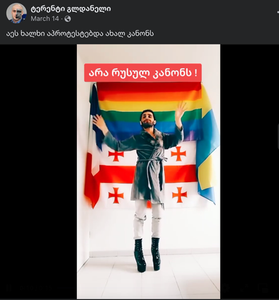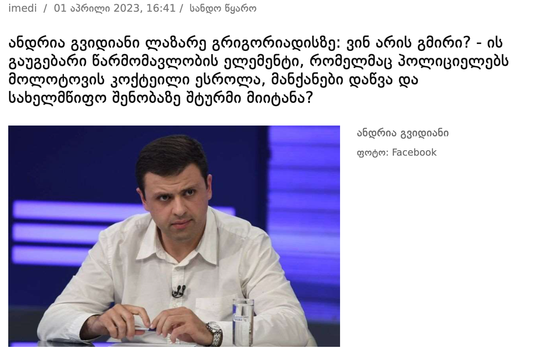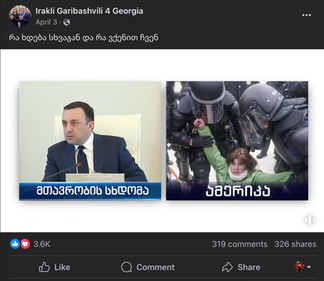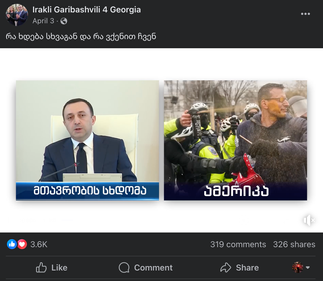The Story of Pro-Government Campaign towards Gen-Z
- Miranda Tetradze
- Jan 22, 2024
- 7 min read
Updated: Jan 31, 2024

The events of March 2023 became one of the most important manifestations of protest in the history of modern Georgia. The law "On Registration of Foreign Agents" (the so-called "Russian Law") caused dissatisfaction among a large part of Georgian society, with young people being particularly prominent. One of the unique characteristics of the "March protests" was the unprecedented number of students and young people involved.
Naturally, along with the magnitude of the protest, the accompanying pro-government campaign, primarily targeted at young people, was also extensive. Within the framework of this campaign, new types of messages emerged in official government sources, pro-government media, support pages, and anonymous groups, during and after the March events. Unlike opposition parties, activists representing the civil sector, and non-governmental organisations, who had been the previous targets of pro-government groups, the youth had never been such a prominent focus of the pro-government campaign. It became evident that the government and relevant pro-government elements paid significant attention to them as both an opportunity and a challenge.
Observing the dynamics of the processes, it was revealed that the campaign aimed at young people had a relatively more complex nature. It can be described as employing the "carrot and stick" method. After March, two directions of the pro-government campaign - negative and positive - became evident. On the one hand, the campaign aimed to discredit Gen Z, and on the other hand, it aimed to "encourage" young people through activities such as bringing famous artists with funds allocated from the state budget, doubling university scholarships, and cancelling debts for suspended students. Moreover, here we can observe a division between the segment of youth targeted for discrediting and those seen as potential "recruits".
As time passes, important events such as the EU candidate status decision and, especially, the 2024 elections will bring a turning point in the political process. The role of youth and students is expected to become even more crucial. Accordingly, this campaign will assume a larger and more intense character. Therefore, it is particularly interesting to study the general character and structure of the youth campaign, which is conducted with a coordinated narrative and a single goal. The purpose of the study is to reveal a correlation and consistency in the behaviour of these actors and to develop a single, clear picture that will establish an initial information base for further research. This will make it easier to categorise the next steps of pro-government actors and understand the real motivation behind the attempts to discredit or make populist decisions.
Methodology
At the initial stage of the research, the activity of disinformation pages, closed groups, and anonymous accounts on the Facebook platform was observed during specific time periods through the use of Disinfo Observer (ISFED). We extracted various messages and contents during this process and prepared what we refer to as "keywords'' for the next stage of analysis. These keywords were utilised to gather statistical information via the IBEX tool. For the purpose of data organisation, the Python programming language was employed to categorise posts obtained through IBEX based on their authors and their incorporation into various segments of the campaign, be it in the form of posts, videos, or other media materials.
Furthermore, as part of the research framework, three episodes of the "Conservatory" program that aired in March were transcribed using the Media Speech tool, with Shalva Ramishvili serving as the anchor and main producer for TV company POSTV."
While monitoring the ongoing campaign alongside the March actions, we identified the use of propaganda and disinformation tactics by various actors, which were already familiar to the public. The evolving dynamics of these processes added an interesting dimension to our research, resembling a longitudinal study. As a result, the second part of the research was dedicated to the positive campaign targeting young people. This campaign was characterised by changes in public policy, such as the cancellation of debts for suspended students and the doubling of scholarships.
Negative Campaign Targeting Youth
The propaganda messages primarily aimed at young people can be classified into several overarching narratives. Subsequently, we will dissect each narrative based on the tactics employed and specific facts. It is crucial to carefully consider both the message content and its timing, as well as its alignment with specific disinformation tactics.
Primarily, it is imperative to identify the most active Facebook accounts during the negative campaign. This can be achieved by employing key phrases such as "Gen-Z," "revolution," "Satanists," "vandalism," "Molotov cocktail," "liberal fascism," "radicals," "Lazare Grigoriadis," and "Franklin Club." Specifically, during March, several pivotal actors were discerned through the utilisation of IBEX and manual data collection:
TV company "Imedi" Facebook page: 28 posts
Facebook page "Terenti Gldaneli": 28 posts
Facebook group "Protest": 14 posts
"PosTV, news": 17 posts
Facebook page "People’s Power": 13 posts
"Ar Agarevinebt" page: 11 posts
Group "Bidzina Ivanishvili and Society": 9 posts
Group "Irakli Garibashvili - A Winner": 8 posts
Group "Irakli Gharibashvili 4 Georgia": 8 posts
Profile "Journalistic Gems": 4 posts
Name-calling: Refers to the use of derogatory language to create a negative image of a person, group, or idea. It is used to discredit and demonise opponents to justify violent actions against them.

Examples: The Prime Minister used labels such as "Satanists", "extremists", "agents", and "anarchists" against the young people at the rally, which were later adopted by various actors.
Selective Manipulation: Refers to the selective presentation of information, especially relevant in the digital age, where images, videos, or quotes are transmitted as distorted messages.
Examples: Dissemination of footage from the March protests, portraying aggressive or provocative actions of certain individuals to discredit the protest participants. Video collages assembled from action footage and the distribution of photo and video materials without context constitute a form of manipulation through selection.
Repetition: This involves repeating a message or idea frequently to make it more familiar and believable. This tactic can create the illusion of consensus or truth, even if the information is not factual.
Examples: This tactic involved conveying two main messages:
Certain forces/countries/organisations use young people.
The young people gathered at the rally had not even read the law.
Big Lie: Manipulates false statements or facts, repeating them with confidence to make them appear as truth. This tactic relies on the idea that people wouldn't believe someone would spread such a brazen lie.

Examples: The main participants of the action were trained by "Franklin Club" and "Girchi". The goal of the young people was to organise a coup similar to the Rose Revolution and Euromaidan, attempting the "Kmara Reincarnation."
Scapegoating: Involves blaming a specific group or individual for societal problems or challenges to divert attention from real issues and create a common enemy against which people's opinions will unite.
Examples: Lazare Grigoriadis, Franklin Club, Free and Agrarian Universities, University of Georgia, and Girchi-trained youth.
Conspiracy Theories: Capitalises on people's interest in hidden information to spread baseless theories, instilling distrust and suspicion of official narratives.
Examples: The Washington-Brussels Plan, Saline, Exclusive Correspondence.
Satire/Parody: Satirical messages about important events are used to soften or change public sentiments in favour of the propagating force. Current events are often covered in a parodic manner to discredit the actors.
Examples: Songs by Master and Zaza Nozadze, shot from the famous Georgian film “Tsisperi Mtebi”, edited, satirical videos (mainly by Terenti Gldaneli).
"Others Do It Too" / Bandwagon Effect: Aggressive actions are often justified by pointing to others' examples. "Others are also doing this" is used to justify arrests and various forceful actions against rally participants.
Examples: Footage of a rally in the Netherlands and a video clip where the Prime Minister talks about the legitimacy of the crackdown.
Selecting a Target: Propagandists choose famous individuals as targets, often those who wield influence, power, or are popular with the masses. Discrediting them can yield important results.
Examples: Gorgiladze and Gafrindashvili, Lasha Bugadze, Keta Bagashvili.
Social Division: Social division can lead to increased conflicts and confrontations between different segments of society. During the March protests, social divisions emerged between police sympathisers and young protestors, leading to polarisation and an "Us vs. Them" mentality. This was followed by increased moral support for police officers by government members.
Examples: A young man throwing the Georgian flag, then, policemen taking it, Kobakhidze's statement, and footage of abuse.
Chronicle of Negative Campaign
March 6-10: The "March Protests" were initiated in response to the Parliament's endorsement of the "Law on Foreign Agents."
March 12: During an interview on Imedi TV, the Prime Minister singled out two main groups of "provocative and destructive youths": the "Franklin Club" and the "Partia Girchi youth."
March 19: Imedi TV broadcast a story titled "Franklin Club Politics," which led to the launch of a discrediting campaign on various Facebook pages and closed groups.
March 29: Lazare Grigoriadis was arrested for allegedly throwing stones and what are commonly referred to as Molotov cocktails.
June 17: A disturbance occurred at a youth camp sponsored by "Girchi" in Borjomi.
Positive Campaign towards Young People
Parallel to the negative campaign following the "March Protests", counter-narratives from the government and pro-government actors began to spread almost immediately. Recognizing the undeniable involvement of young people in the March events, categorising them into 'good' and 'bad' groups proved to be a strategically advantageous approach for pro-government actors.
Even in a March 12 interview, Prime Minister Irakli Gharibashvili addressed the protests against “the Russian law”, highlighting a clear division among young people. On one side were the 'Satanists' and students 'influenced by destructive forces,' while on the other side were the 'moderate youth' who 'remained non-aggressive, protested peacefully, and supported the idea of Europe.'

Following the 'March events, a new Minister of Education and Science, Giorgi Amilakhvari, was appointed. In the months that followed the minister's introduction, the Prime Minister introduced several significant initiatives that would have a direct impact on 'outstanding' and 'talented' students. These initiatives included doubling the number of students receiving scholarships and increasing scholarship amounts, offering a one-year scholarship to students with the best results in the Unified National Examinations of 2023, debt cancellation for suspended students, and funding for studying abroad for more than 1,000 'top' students.
Additionally, an initiative indirectly related to young people was the 'Starring Georgia' project, organised by the 'Black Sea Arena' - which was gifted to the state by the “Cartu Foundation” (charity fund established and financed by Georgian tycoon and former Prime Minister Bidzina Ivanishvili). This project brought six famous artists to Georgia. An online media article about the project emphasised its significance for young people, stating that they would no longer need to travel abroad to attend concerts by their favourite bands. Prime Minister Irakli Gharibashvili also lauded the project's success and hinted at 'very important, significant surprises' to be organised in Georgia in 2024.






















































Comments